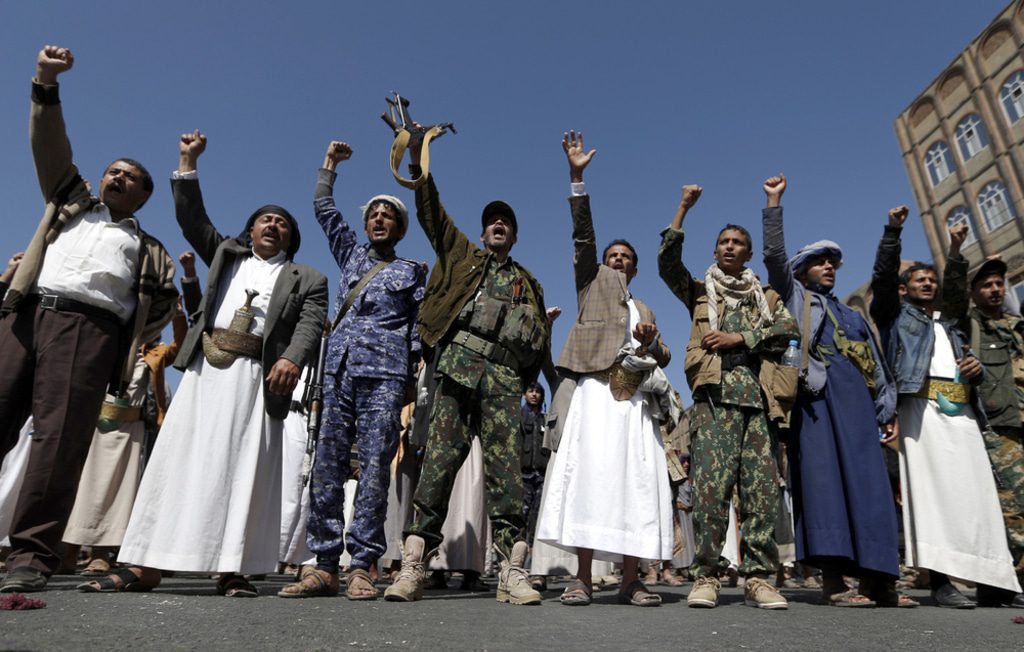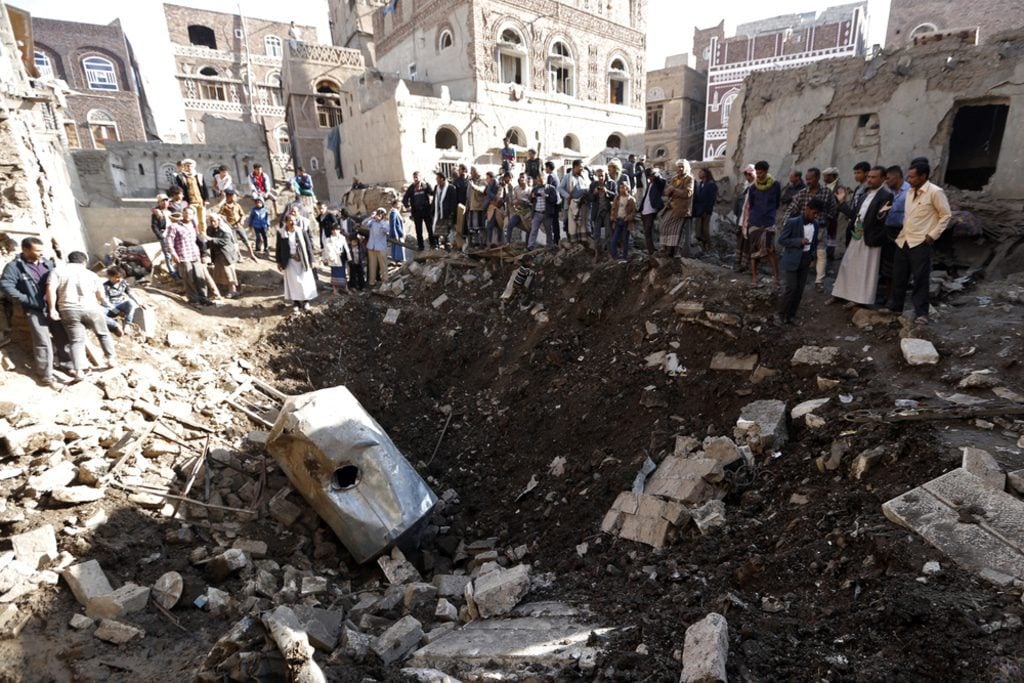
The brutal civil war in Yemen has become further complicated after Saudi officials announced on 4 November 2017 that they had intercepted a missile fired by Houthi rebels in Yemen near Riyadh’s King Khalid International Airport.
The officials blamed Iran for the missile attack, calling the rival country’s role in arming and supporting the rebels a “blatant act of military aggression by the Iranian regime” that “could be considered as an act of war against the Kingdom of Saudi Arabia”.
The White House took a similar line, as the Saudis cut off access to all of Yemen’s ports, which have been blockaded since a Saudi-led coalition launched Operation Decisive Storm in March 2015, and intensified its air strikes on the Yemeni capital Sanaa. The capital has been controlled by rebels since they seized power from the government led by President Abd Rabbu Mansour Hadi in 2014, with help from former President Ali Abdullah Saleh.
Hadi had taken refuge in Saudi Arabia but has since been placed under ‘a form of house arrest’ and banned from returning to his country, possibly due to bad blood between him and the United Arab Emirates (UAE), which is part of the coalition, according to the Associated Press.
United Nations (UN) officials protested the additional blockade, which they said threatened to plunge Yemen into famine. Iran denied being behind the attack.
In recent months, international scrutiny of the Saudi role in Yemen’s increasingly complex conflict has been growing, especially after a recent air strike by coalition forces on a busy market in northern Yemen demolished a hotel and killed 26 people.
All sides in the conflict stand accused of human rights violations. The Saudis have pushed back vehemently against the allegations but appear to have suffered a diplomatic defeat in recent months, as the UN has recently agreed to open an inquiry into alleged war crimes in Yemen and cited the Saudi-led coalition, along with other groups fighting in Yemen, in a report on groups that have harmed or killed children in conflict areas.
However, after the Saudis waged an aggressive campaign, including threatening to withdraw millions of dollars from UN programmes, including for Palestinian refugees, the allegations were withdrawn from the final report. The decision angered rights groups, which accused Ban K-imoon, then UN Secretary-General, of bowing to pressure.

However, this year’s Children and Armed Conflict report – issued under Ban K-imoon’s successor António Guterres – did list the Saudi coalition among the groups that had violated children’s rights, noting that of 1,349 war-related child deaths and injuries verified by the UN in Yemen in 2016, the Saudi coalition was believed to be responsible for 683 and the Houthis and allies for 414. The report also found that the coalition had been responsible for attacks on 28 schools and ten hospitals, and for an October 2016 air strike on a funeral in Sanaa, which killed at least 24 children.
The criticisms were softened by a mention of corrective actions the coalition had taken ‘to reduce the impact of conflict on children, including through their rules of engagement and the establishment of a joint incident assessment team mandated to review all incidents involving civilian casualties and identify corrective actions’.
Saudi officials continued to push back against the allegations of their role in killing and injuring children, saying at a press conference that the report contained “false information”. However, they praised the inclusion of the information about measures taken to protect civilians. The officials also pointed the finger at Iran, blaming it for the ongoing conflict and saying it has blocked peace attempts and fuelled continuing fighting by arming the Houthis.
Some rights groups celebrated the report, with Human Rights Watch announcing, ‘This year, Secretary-General Guterres has not let the Saudi-led coalition off the hook.’ But Amnesty International said in a statement, ‘The international community has caved in to political pressure again, underplaying the suffering of hundreds of Yemeni children, by watering down criticism of the Saudi Arabia-led coalition’s grave violations of international law.’
The release of the report came just days after the UN agreed to open an inquiry into war crimes in Yemen. The final plan was a compromise. A group led by the Netherlands and Canada had originally pushed for an ‘international commission of inquiry’, the toughest standard of UN human rights investigations, but eventually agreed on an ‘international eminent group of experts’. Saudi Arabia had pushed back against any external investigating body, proposing instead that the UN provide experts to Yemen’s national commission, which is seen by critics as too close to the Saudis to conduct a credible inquiry.
Meanwhile, a group of politicians in the United States (US) has been calling for that country to stop supporting the Saudi campaign, proposing legislation that would remove US forces from ‘unauthorized hostilities’ in Yemen. The members of Congress sponsoring the bill said US assistance to the Saudi coalition in fighting the Houthis and allies, including refuelling warplanes, was not authorized by Congress and ‘is counterproductive to ongoing efforts by the United States to pursue al-Qaeda and its associated forces’. The long-running US campaign against al-Qaeda in Yemen has also been criticized for killing civilians in drone strikes.
Analysts with the Sanaa Center for Strategic Studies, a Yemen-based think tank tracking policy developments, wrote, ‘While this resolution is not expected to gain the votes required to pass, it is reflective of growing congressional concerns regarding the US role in Yemen and the president’s ability to unilaterally launch military operations.’ Meanwhile, in spite of progress made in fighting a devastating cholera epidemic, conditions on the ground in Yemen remain dire.
Médecins Sans Frontières has begun closing or reducing the capacity of cholera treatment centres, saying the number of admissions had shrunk from 11,139 in the third week of June to 567 in the second week of October 2017.
Yet the fading epidemic is a bright spot in an otherwise grim situation. According to the UN, the threat of famine is increasing, with 17 million people facing insufficient food and 1.8 million children acutely malnourished. From March 2015 to September 2017, 8,673 conflict-related deaths and 49,963 injuries were reported by health facilities, but the actual number of casualties is believed to be higher, since many casualties never make it to a health facility and are therefore unreported.
There are also more than 20 million people in need of humanitarian assistance, which often does not reach them because aid deliveries have been disrupted by all parties in the conflict.


